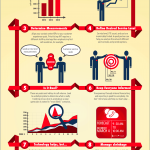Rising Wage Demands Becoming A Source of Concern For Employers
August 9, 2016

The post-recession boom could to be turning into a liability for many employers. This seems to be the hidden message in the latest Emerging Workforce Study (EWS). The study findings show that many employers are becoming increasingly troubled by raising wage demands brought about by an expanded jobs market.
The EWS is an annual in-depth research study commissioned by Spherion Staffing. Now in its 19th year, the study tracks the critical issues driving the American workforce. Such issues include employee engagement, retention, performance and productivity. The 2016 edition focused on trends of worker compensation, workplace diversity and factors which drive employee retention.
The most poignant finding of the 2016 EWS is that jobs market growth which has characterized the post-recovery period is having a negative impact on employers. During the early stages of the recovery period, the jobs market was flooded with workers. These were mostly people who had been laid off in the cost-cutting drives which characterized the recession.
The jobs market, therefore, had a glut of people who were anxious to get back to work. These people were willing to accept relatively low compensation. As such, many employers, sensing an opportunity (and buoyed with financial windfalls from the budding recovery), started hiring massively.
Unfortunately, this massive hiring has now led to an increased demand for workers – especially top talent. With many employers looking to hire, power has swung back into the hands of workers. The workers are maximizing their new-found power by demanding for more wages – much to the chagrin of many employers.
According to the 2016 EWS data, 51 percent of the workers interviewed said that the expanded jobs market gives them more power to negotiate for higher wages with their current employer or other employers. A total of 2,810 US workers were interviewed during the study, all of them 18 years or older.
More than one-third (37 percent) of the workers said that they felt pressured to accept a lower salary while starting their current role. However, they now thought that their wages should be increased. Almost two-thirds (63 percent) of workers said that if an employer increases the minimum wage for some positions, they should do the same for all employees.
The study found a greater willingness for workers to switch jobs, with 26 percent reporting that they were likely to look for a job within the next year. This is a significant increase from the 18 percent who reported the same during the 2015 EWS. Such figures have worrying implications for employers. It means that turnover could be on the rise, with the one thing employers can do to stem the tide being bumping up their compensation offers.
 In fact, the EWS shows that compensation is among the top concerns for employers. During the study, 416 human resource managers were interviewed from various industries and locations around the US. The majority of them reported feeling the pressure to keep up with employee wage demands.
In fact, the EWS shows that compensation is among the top concerns for employers. During the study, 416 human resource managers were interviewed from various industries and locations around the US. The majority of them reported feeling the pressure to keep up with employee wage demands.
According to the study findings, 74 percent of employers reported having had to increase wages in order to compete effectively. Another 73 percent reported having seen their competitors raise wages. Worryingly, a full 62 percent said that they understand the importance of raising wages, and want to raise their wages, but cannot afford to raise them. Similarly, a full 44 percent said they believe that a wage increase would significantly impact their operations.
The EWS report describes the current situation as a “wage war” where employers are increasingly attempting to gain a competitive advantage by offering higher wages. This situation is leaving those who cannot afford the higher wages at a significant disadvantage.
Besides the emerging wage war, the 2016 EWS examined two other issues which are having a significant impact on today’s workplace. The first was the issue of diversity. According to the study findings, both employers and workers agree that workplace diversity is important.
During the study, 75 percent of employees reported that a workplace which is diverse and inclusive promotes growth and learning. The number of employers who felt the same was even greater – with 85 percent agreeing with the role of diversity in promoting learning and growth.
However, both employers and employees also agreed that the initiatives aimed at fostering inclusion weren’t being well-executed. When asked to grade the efforts taken by their organizations to create an inclusive workplace, only 28 percent of workers, and 24 percent of employers gave their organizations an “A”. Almost one-third (32 percent of workers and 33 percent of employers) gave their organizations a grade of “C,” “D” or “F”.
The rising focus on diversity could be having a significant impact on hiring decisions. The growing perception seems to be that, when hiring, many employers are now considering diversity even more than qualifications. Thirty-seven percent of workers reported that when their companies are hiring for new positions, the need for diversity seems to trump qualifications. Thirty-one percent of employers reported feeling the same.
The final issue examined in the 2016 EWS is employee retention. Employers reported continuing to struggle with retaining employees. A full 47 percent of the employers reported having had to replace over 20 percent of their entire workforce during the previous 12 months.
The main reasons reported by employees for wanting to leave over the next 12 months included searching for better opportunities, being unhappy with their current salary and feeling undervalued by their current employer. Amazingly, employers reported thinking that supervisor relationships are at what most influences retention.
However, according to employees, the main factors which influence their retention are (1) financial compensation, (2) benefits, (3) growth & earnings potential, (4) time & flexibility, (5) culture & work environment, (6) management climate, (7) supervisor relationship, and (8) training & development.
Ultimately, the 2016 EWS offers useful insights to both employers and employees. For employers, the most important insight is the glaring disconnect between what they think drives employee retention, and the actual drivers – according to employees. Given the high rate of turnover, this is an invaluable lesson.
Even then, the main thing employees seem to be most concerned about is pay and benefits. This is perhaps karma coming back to bite employers for deliberately starting new hires on low salaries during the times when there was a glut of talent. Now that there is a shortage of talent, employees are repaying the favor by demanding higher wages. In the end, organizations that want to retain their best employees may just have to figure out how to raise those wages.
Business & Finance Articles on Business 2 Community
(35)













